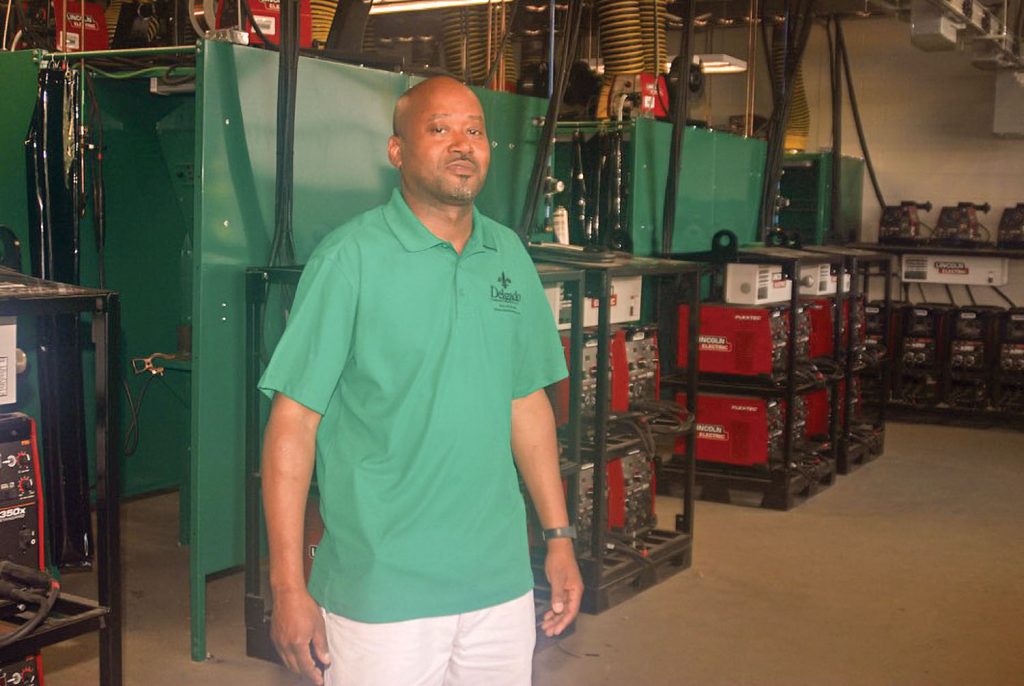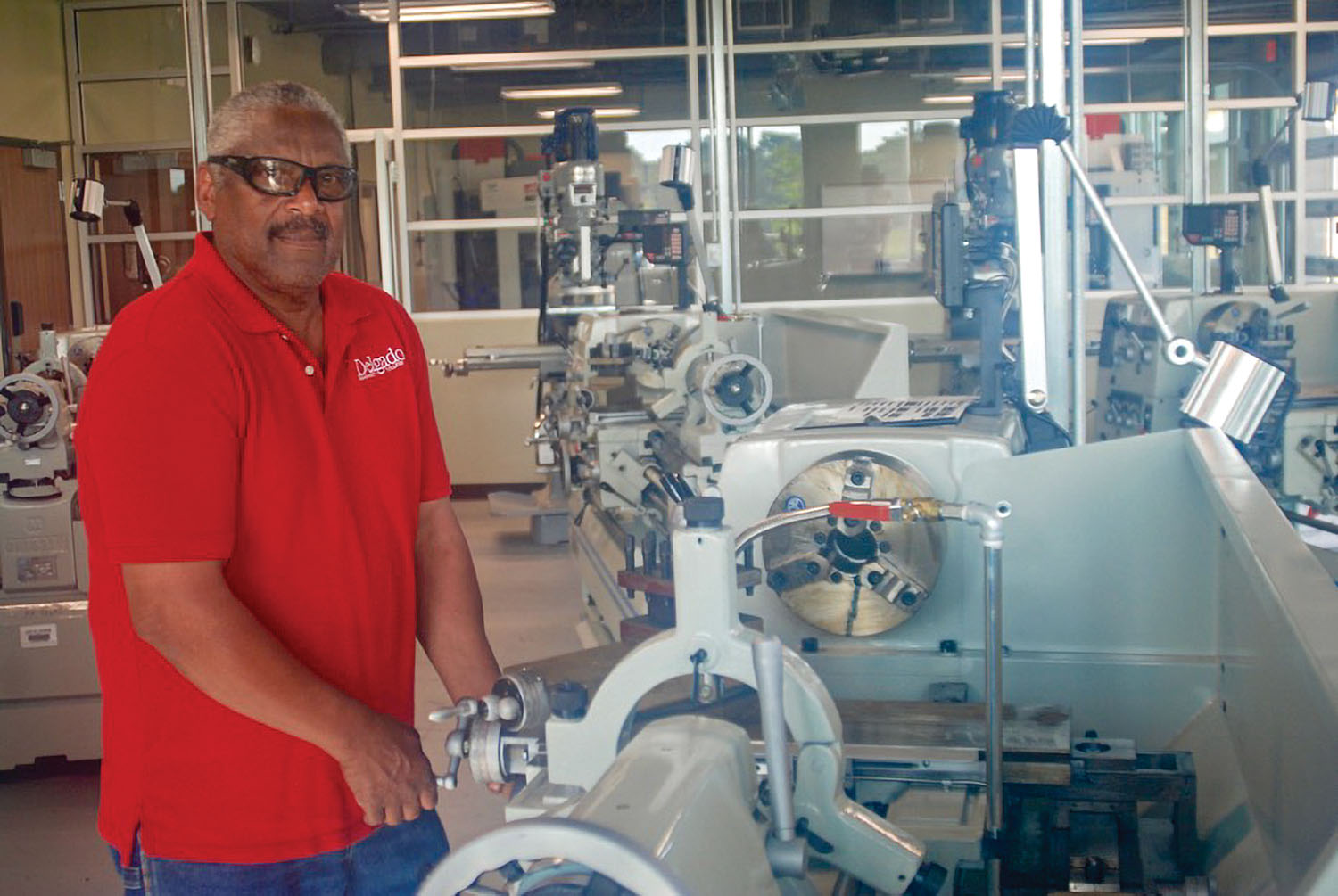Delgado Community College recently held a career day to recruit instructors for its new River City & Advanced Manufacturing campus located near the Huey P. Long Bridge upriver from New Orleans.
Rick Schwab, who is the senior director for the Marine & Industrial Training Center, will also direct activities at the River City & Advanced Manufacturing campus. Funding for the school came in part from a $10 million grant from Ingalls Shipbuilding, which acquired, then closed, nearby Avondale Shipyard.
Much like the Marine & Industrial Training Center offers courses to satisfy Coast Guard requirements for mariners, the Advanced Manufacturing school will offer courses to give students training certificates for “shipyard skills,” including machinists, welding, shipwright and carpentry, electrical, plumbing, diesel mechanics and megatronics (robotics), Schwab said.
“Delgado worked with its industry-based advisory board and steering committee to develop classes designed for beginners through advanced levels to provide training that will prepare students for real jobs and skill sets needed by industry,” Schwab said. “The classes are designed by industry to help students get a job, retain jobs and advance in pay grades.”
The modular design of classes is not designed as much for degree advancement as it is for securing a job and working to advance skills needed on the job, Schwab said.
Delgado understands that industry has immediate needs for skilled employees, he said. Beginning students can take classes for basic knowledge, get a job and earn money, and then take advanced classes on weekends or nights that will increase their earning capability.
Much like the maritime training, Schwab said classes can be tailored, for example, for a vessel engineer who is a good diesel mechanic, but lacks skills in electrical or hydraulic fields.

Alcindo Frye is a senior administrative coordinator with 17 years of experience at Avondale Shipyard. With 5-1/2 years at Delgado, he helped design the welding shop that features 51 welding booths.
Gas bottles for welding are located outside and the gas is piped to each station, Frye said. In addition, there are two welding simulators for students to practice on before actually working with metals.
Training on all types of welding is available, including GTAW (gas tungsten arc welding), SMAW (shielded metal arc welding or stick welding), FCAW (flux core arc welding) and GMAW (gas metal arc welding for aluminum). Six stations are set up for high frequency aluminum welding, Frye said.
As a safety feature, an exhaust system pulls all of the welding gases out of the building. Also outside are eight grinding stations and cutting torch stations using oxygen and propane.
The fitting station has metal tables where real world experience can be learned.
Frye said his students will build equipment for the Fire School from blueprints as class projects.
After three weeks, a student can get a job as a tacker, Frye said. Nine more weeks of training will give the student credentials to work as a welder using FCAW or GMAW.
A beginning student can take an intensive four-month program to learn the basics of diesel mechanics. The building was designed with high overhead doors for large trucks to be driven in for hands-on training, Frye explained. That class was also designed by industry members of the advisory board to teach what the student will need to know on the job.
“The old way of teaching was for a student to attend classes for two years and maybe find a job when he graduates,” Frye said. “Delgado teaches skill sets, sends the student into the real world with a job where he can gain experience and confidence, then return on weekends or at night for advanced training specified by the companies.”
Companies working with Delgado know what a student was taught and what to expect in way of expertise, he said. Then the company can send the student back for more advanced training based on the company’s needs.
Parts Manufacturing
John Guidry is an instructor teaching advanced manufacturing. He conducted a tour of both manual and automated parts manufacturing. He worked at Avondale Shipyard and other companies making parts for oilfield, diving and specialty items.
“All we need is a drawing and specific requirements for what materials are required to build parts for manufacturing,” Guidry said. “Students can keep the drawings and the parts they make as a resume for future employers.”
In a tour of the machinist facility, Guidry said an employee working on manual machines can make more money than those working on automated CNC machines. Once a manual part is made, tested and proven, that part can be programmed into an automated CNC machine, which can crank out many more identical items.
“The average person has no idea what a machinist does and does not know parts,” Guidry said. “There is a big demand for qualified machinists.”
He compared the machinist to a body man at a car repair shop. A fender man changes out parts, but a machinist actually builds the parts.
Guidry put his hands on one of the manual machines. “This is the only machine that can make its own self, every part,” he said explaining the value of skilled machine operators.
Electrical Shop
In the electrical shop, Jerry Kaywood III said he has 34 years working as an electrician at Avondale Shipyard. Beginning students are taught electrical symbols and blueprints, testing their knowledge on a computer screen before moving to actually wiring devices on an AMATROL board.
As a student advances, he is taught troubleshooting electric systems and moves on to programmable logic controls (PLC). Training begins with residential, then advances to commercial and PLC designs.
In addition, the Advanced Manufacturing facility has labs for quality assurance where products are tested for fatigue and breaking strength, labs for both chemistry and biology, along with facilities to teach hydraulics, process control, and oil and paper manufacturing.
Delgado is applying to be one of the 12 national centers for excellence from the American Welding Society, a designation that will take the better part of a year to obtain, Schwab said.
Individuals with experience in the above fields should contact Delgado if interested in an adjunct teaching position.
Caption for top photo: John Guidry and CNC machine. (Photo by Capt. Richard Eberhardt)




